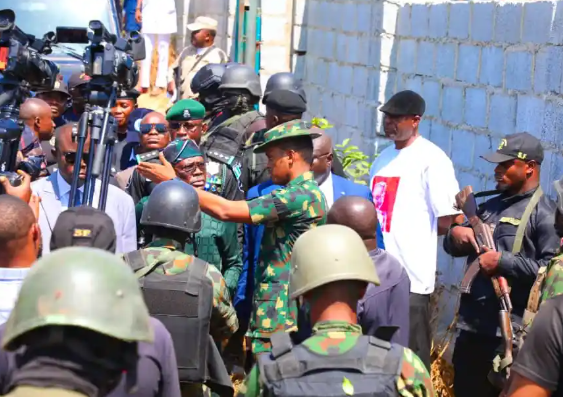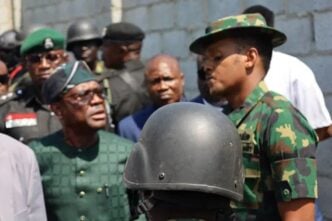BY NNAA KALU NTO
When the Minister of the Federal Capital Territory, Nyesom Wike, arrived at a property allegedly belonging to a former Chief of Naval Staff, he could hardly have imagined that his demand to see a land title would lead to a confrontation with armed military personnel. The property, reportedly under construction, was being guarded by a young soldier who refused the minister and officials of the Department of Development Control access to the site. What followed ( an exchange of words and visible tension) has now become a national conversation about authority, duty, and respect between civil and military institutions in Nigeria.
At the heart of the matter lies an important question: who acted rightly and who went too far?
Understanding the Role of the Department of Development Control
Advertisement
The Department of Development Control (DC), under the Federal Capital Development Authority (FCDA), is mandated by the FCT Act of 1976 to regulate and monitor physical development within the Federal Capital Territory. Its role is to ensure that all buildings, structures, and land uses conform to the Abuja Master Plan. The department is empowered to inspect construction sites, verify building approvals, and stop any ongoing work that violates city regulations.
Furthermore, under Section 28 of the Land Use Act (1978), the government reserves the right to revoke or review land allocations in the public interest, particularly when proper documentation or approved development plans are absent. This means that when the Minister or his representatives seek to inspect a property, especially one under construction, they are performing a legal and civic duty to protect public order and ensure lawful development.
In this light, Wike’s visit was neither a witch hunt nor an overreach; it was a legitimate exercise of ministerial oversight.
Advertisement
Why the Military Was Wrong to Deny Access
While the Nigerian military plays a crucial role in defending national security, it must operate within the boundaries of civil law. The deployment of military personnel to guard private property, though not illegal in itself, must not obstruct civil authorities from performing lawful duties.
The refusal of the soldier to allow officials from the Department of Development Control to access a site under their jurisdiction was both administratively and morally wrong. The military’s duty to protect should never override the oversight role of civil agencies. Even if the soldier was acting under orders, professional conduct demanded that he contact his superior officers immediately instead of denying access outright.
Such defiance undermines the constitutional principle of civil supremacy over military authority, which is a cornerstone of democracy. It also reinforces public suspicion that powerful individuals may be using state security forces for personal protection, a trend that corrodes institutional integrity.
Advertisement
Wike’s Conduct: Right Intention, Wrong Expression
Minister Wike’s insistence on seeing the title document was not only correct but also commendable. Nigeria’s capital has suffered years of unregulated construction, illegal land allocation, and abuse of zoning laws. His determination to restore order in the FCT is a step many citizens welcome.
However, his choice of words, particularly calling the young officer a “fool”, was regrettable and unbecoming of a leader of his stature. Leadership is tested not only by firmness but also by restraint. The soldier, though mistaken, was a subordinate acting under instruction, and public rebuke undermines the moral clarity of the Minister’s actions. In moments like this, the true strength of authority lies in composure, not confrontation.
A History of Civil–Military Clashes in Nigeria
Advertisement
This incident is not the first of its kind. Nigeria’s history is dotted with uneasy encounters between civil authorities and the military.
In 2018, tensions flared between the Benue State Government and the military over the enforcement of the anti-open grazing law, with each side accusing the other of overstepping constitutional limits.
Advertisement
In 2021, a group of soldiers clashed with officials of the Lagos State Traffic Management Authority (LASTMA) after an altercation involving a uniformed officer, leading to public outcry over military interference in civil matters.
Earlier, in 2008, a confrontation between soldiers and policemen in Lagos spiralled into deadly chaos, underscoring how fragile the relationship between Nigeria’s security agencies can be when institutional ego overshadows cooperation.
Advertisement
Each of these episodes, like the current one, highlights a recurring moral imbalance, where mutual respect gives way to institutional arrogance and poor communication.
The Broader Moral Picture
Advertisement
The Abuja confrontation is not simply about Wike or a soldier; it reflects a deeper governance issue: the blurred lines between authority and accountability. Civil institutions like the Department of Development Control exist to uphold public order and ensure fairness in urban management. The military exists to protect the state from external and internal threats. When either institution strays beyond its lane, governance falters.
Wike’s action was right in principle – to verify legality and uphold the rule of law. The military officer’s stance, though loyal to his orders, was wrong in spirit, because obedience should never become an excuse for defying legitimate civil authority. Yet, Wike’s insult was an unfortunate dent on an otherwise noble stand.
My One Kobo On The Matter
Both parties acted within their perceived duties, but one lost moral tone while the other lost administrative judgment. The Department of Development Control had full legal and moral prerogative to inspect the property, and preventing that access was an unjustifiable obstruction of lawful civil oversight.
Wike’s actions were right in law and purpose but flawed in delivery. His words momentarily clouded the righteousness of his mission. As Minister of the Federal Capital Territory, Wike wields both the authority and the instruments of enforcement or as our people say, ‘he holds both the yam and the knife’. A simple verification of the property records would have sufficed, allowing him to take whatever action was necessary in line with the law and established administrative procedures.
Nigeria must learn that institutions thrive not on power plays but on cooperation, mutual respect, and adherence to law. The military must always remain subject to civil authority, and civil leaders must wield that authority with dignity.
Our people say, “A man who uses anger to lead will walk alone when calm returns.”
True governance demands not just power, but patience; not just authority, but respect.
Nnaa Kalu Nto ([email protected]) is the founder of Analytix and is a good governance advocate based in Abuja.
Views expressed by contributors are strictly personal and not of TheCable.






